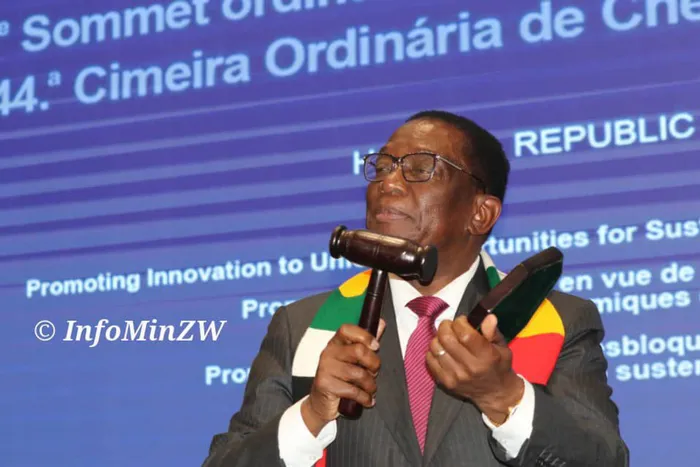Deputy President Mashatile in Harare as SADC chair, President Mnangagwa hosts SADC meeting

SADC chairperson, President of Zimbabwe Emmerson Mnangagwa is hosting the Extraordinary Meeting of SADC heads of State and government in Harare. File Picture: Information Ministry Zimbabwe/X
Deputy President Paul Mashatile is on Wednesday representing President Cyril Ramaphosa at the Extraordinary Meeting of SADC heads of State and government in Harare, Zimbabwe.
The summit will, among others, receive an update on the security situation in the eastern Democratic Republic of Congo (DRC) and also consider a report carried out on the SADC Mission in the DRC (SAMIDRC).
The Presidency said the summit will also review the mandate to inform the future of the SADC mission before it expires on December 14.
“South Africa, through its participation and contribution to the SADC Mission in the DRC, continues to play an important role in efforts to bring about peace and security in the SADC region,” said Mashatile’s acting spokesperson Keith Khoza.

The SADC summit is preceded by the Extraordinary SADC Organ Troika Summit Plus SADC Mission in the DRC (SAMIDRC) Troop Contributing Countries (TCCs) to be held in the morning of Wednesday.
Political violence which erupted in Mozambique is set to dominate the regional bloc’s meeting in Harare, after Maputo and other regions experienced post-election fallout which was also felt by other countries in the region.

Earlier this month, IOL reported that Minister of International Relations and Cooperation, Ronald Lamola, had a telephonic conversation with his Mozambican counterpart, Minister Verónica Macamo, and the two ministers reflected on the current security situation in Mozambique, following the highly-disputed outcome of the country’s general elections.
Violent protests resulted in the busy Lebombo port of entry bordering South Africa and Mozambique being temporarily closed, on different occasions, as Mozambican port officials fled into South Africa, fleeing violence.
The vast southern African nation has been rocked by violent clashes and protests in several cities following the disputed October 9 presidential election.
Furthermore, South Africa has welcomed the convening of the SADC Extraordinary Organ Troika Summit and the SADC Extraordinary Summit, set for Wednesday, in Zimbabwe under the leadership of chairperson of SADC, President of Zimbabwe, Emmerson Mnangagwa.

Earlier this week, IOL reported that some South African truck drivers are counting themselves “lucky” to have returned home unscathed, having dodged the violence that erupted in Mozambique following the elections there.
Others were not as fortunate as they attempted to get to the Lebombo border post, the main crossing between Mozambique and South Africa, as their vehicles were pelted with all manner of projectiles.
Frelimo were declared winners after the general elections were completed but the opposition Optimistic People for the Development of Mozambique (Podemos) party and their leader, Venancio Mondlane, claimed that the results were rigged.
Mondlane mobilised his supporters, a week later, to participate in protests and strikes as an expression of displeasure over the election outcome.
The call to action was heeded by thousands, barricades were set in strategic places, including near the Lebombo Border, and clashes between police and protesters occurred at some hotspots.
With the disruptions raging on this week, human rights groups said more than 30 people have since been killed.
IOL
Cabinet congratulates Mozambique’s Daniel Chapo, Botswana’s Duma Boko and US’ Donald Trump and seeks to deepen trade with China
JUST IN: Mozambican port officials flee into South Africa again, Lebombo border closed as violence flares up
‘Postpone non-essential travel to Mozambique’: Lamola engages his Mozambican counterpart amid rising tensions